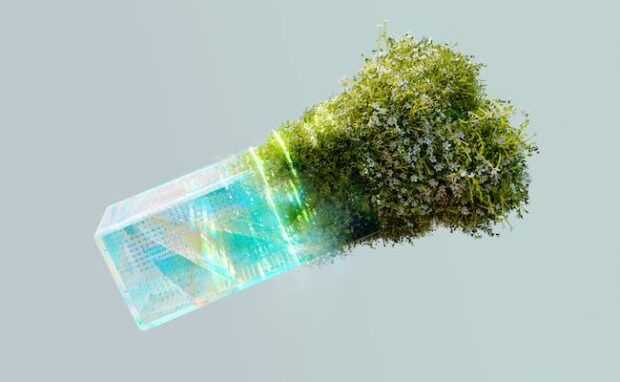AI helps find over 20,000 new materials
Artificial intelligence is supercharging our discovery and development of new materials. Google DeepMind created an AI program that simulates combining these substances and rating their stability. Axios reported the program helped discover more than 2.2 million hypothetical materials. More importantly, 381,000 were stable enough for further experimentation.
We’ve been able to do amazing things with modern technology, but it needs new materials to benefit us further. For example, many scientists need them to provide more sustainable alternatives to fossil fuels. Artificial intelligence may facilitate that research and more as it makes it easier to identify possible options.
This article will discuss how Google’s AI department created a program that facilitates material development. Later, I will show you how artificial intelligence does a similar task for other industries.
How does the AI materials program work?

DeepMind used data from the Lawrence Berkeley National Laboratory (LBNL) and other sources to train its artificial intelligence. It calls the program the Graph Networks for Materials Exploration or GNoME.
GNoME uses two deep learning models that represent atoms and bonds in a molecule as a graph. The first uses known crystal structures and substitutes elements with others to produce candidate structures.
On the other hand, the other uses the candidate’s chemical formula or composition to rate its stability. Then, it filters the candidate pool and evaluates them with quantum mechanics simulations.
Later, it returns the information to the model to complete a training loop called active learning. DeepMind’s materials discovery leader, Ekin Dogus Cubuk, said the program found AI materials “which have proven to be difficult for human scientists.”
You may also like: Google DeepMind is developing a better AI than ChatGPT
More importantly, this artificial intelligence could generalize beyond its training, further improving its results. “If we really want to use these tools for discovery, we want to look where we haven’t looked before,” said Keith Butler, a professor of computational materials chemistry at University College London.
Of course, we want AI materials to work in real life. However, these tools usually don’t explain why they made specific combinations. “If you can ask the model, ‘What is it that made you make this decision?’ That is where you can get new knowledge,” Butler added.
Olexandr Isayev, a chemistry professor at Carnegie Mellon University, said some types of scientific experimentation are “really amenable for automation with machine learning and AI.” Also, he added, “Software plus hardware” is where “the next advances in the sciences are going to be.”
Other AI discovery projects

Artificial intelligence also helps in producing new medical treatments. For example, Hong Kong-based biotech firm Insilico Medicine created the world’s first fully AI-generated drug.
The company used its proprietary AI software, Pharma.AI, to produce this medicine. Here are its three parts and their functions:
- PandaOmics identifies the parts of a virus that a drug must target.
- Chemistry42 designs new potential drug compounds that aim at PandaOmics’ targets.
- InClinico predicts the success rate of clinical trials and identifies trial design issues.
Pharma.AI helped design and synthesize roughly 80 molecules, enabling Insilico Medicine to find a promising drug candidate in 18 months. Also, it achieved “unprecedented success rates for preclinical drug candidates.”
The food industry has also been leveraging artificial intelligence to produce new flavors for foods and drinks. For instance, Japan-based beverage firm Sapporo uses it to make new refreshments.
It partnered with IBM Japan to build an AI program that can “produce over 1 trillion combinations” for new flavors. To demonstrate how it works, let’s say you are a Sapporo marketer who wants to create a refreshing summer drink using the beverage-making AI.
You would start by entering a general concept into the machine, such as “drink that tastes like a cool summer breeze.” Then, you would select up to ten flavor descriptors like “sour” or “sharp.”
You may also like: ChatGPT Experience Is Now More Valuable Than A College Degree
You can choose one of 170 past Sapporo products as a reference. Consequently, the drink AI will generate 100 possible formulations for the product in seconds, based on 1,200 previous formulations and 700 ingredients.
The app will rate the flavors on a scale of 100 based on how closely they resemble the initial description. As a result, the entire process of creating a new flavor, from market analysis to consumer feedback, usually takes four to six months.
Soichi Sakashita from the Sapporo unit of Sapporo Breweries said, “Theoretically, the system can produce over 1 trillion combinations. We could double the speed of the testing cycle and eventually triple it once we have the know-how.”
Conclusion
Google DeepMind has created an AI program that significantly expedites the discovery of new materials. At the time of writing, it discovered roughly 2.2 million hypothetical candidates and 381,000 stable ones.
Axios said we’ve been discovering new materials to replace previous ones for hundreds of years. However, AI helps scientists speed up the process to produce more innovative products.
Learn more about the AI materials research study from its Nature webpage. Moreover, learn more about the latest digital tips and trends at Inquirer Tech.